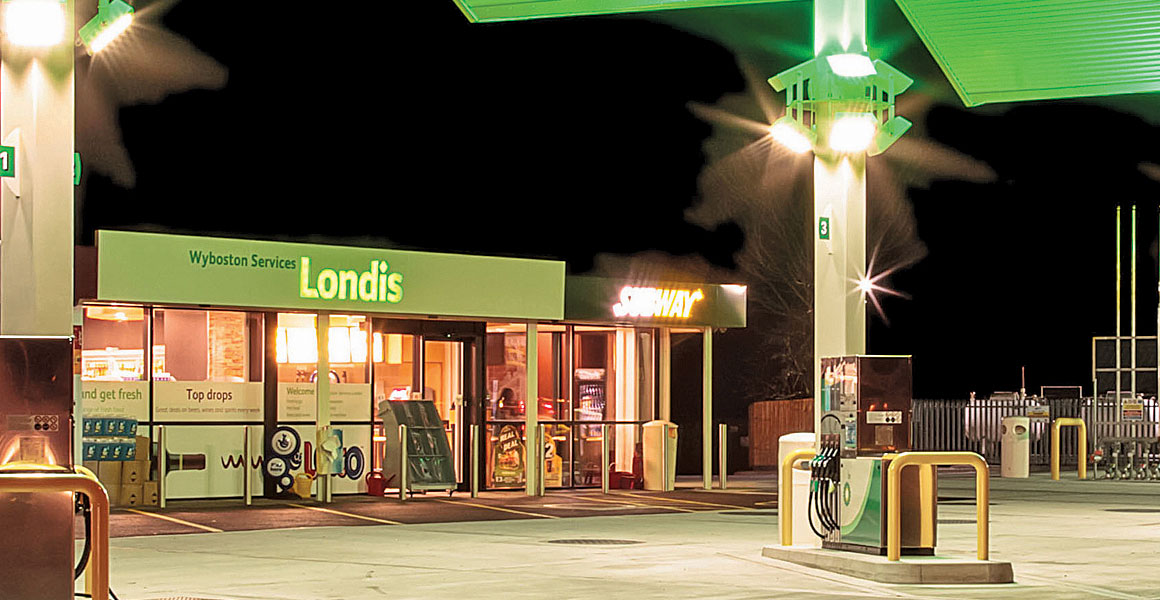The UK’s petrol forecourt retailers have invested 58.3% more in their own stores on average year-on-year – almost £19,000 on average per store in 2023, compared to less than £12,000 in 2022.
The results have been published in ACS’ Forecourt Report 2024, an overview of the 8,347 forecourt sites in the UK. Top areas of investment for forecourt retailers last year were revealed to be refrigeration, technology, and shelving.
ACS chief executive James Lowman said: “Forecourt retailers have made significant investments in improving their offer to customers over the last year, spending money on futureproofing their stores through new technology and refrigeration, as well as into services like parcel collection points and click and collect for groceries.
“Investments in facilities for motorists to power their vehicles – whether that’s EV charging, new tanks or pump technology – come with high cost and risk for these businesses against the backdrop of uncertainty over the rate of EV adoption and future fuel margins. Whereas changes to stores are usually small and iterative and can be reversed and altered at a proportionate cost, each of these infrastructure investments is business critical. The sector needs consistency, certainty and feasible lead times to plan effectively.”
EXCLUSIVE: Symbol groups slashed funding for store investments in the last year
The value of sales in the forecourt sector, excluding fuel, has reached £5bn in the last year. Meanwhile, the most lucrative category for forecourt sales was found to be tobacco and vaping (£741m), followed by soft drinks (£468m) and beers, wines and spirits (£312m).
Petrol stations rank as fifth in ‘essential local services’, falling behind convenience stores which rank as third. The majority of forecourts offer bill payment services (88%) and mobile phone top-ups (77%), but only 15% offer and Post Office and 27% offer a parcel collection point. Customer-operated coffee machines are likely to be found on-site at a forecourt though, as 85% offer this.
Peter Batt, managing director at Nisa said: “Today’s ACS Forecourt Report rightly shines a light on the ever-growing importance of forecourts to convenience retail. As the conventional fuel-and-go model fades, forecourt retail is transforming to meet the needs of a more dynamic shopper. With larger basket sizes, a broader food-to-go selection, and an improved array of quality food and beverage options, forecourts are increasingly becoming comprehensive shopping destinations in their own right, enhanced by the addition of EV charging points meaning drivers have more time to spend.”
The report also found that, compared to last year, significantly more charging points (59%) are now catergorised as ‘slow’ chargers, as battery and charging technology improves and ultra-rapid chargers are getting faster than ever before. There are now almost 1.2m fully electric vehicles and around 680,000 plug-in hybrid vehicles registered in the UK.
Motor Fuel Group to install 300 laundry machines in forecourts
Additionally, 84% of independent forecourt retailers were found to have engaged in some form of community activity last year.
Lowman added: “It’s also encouraging to see that more forecourt retailers are investing time and effort into community engagement. For tens of thousands of people, their main local shop also sells fuel, so being a community hub is just as important for forecourt retailers as it is for their standalone convenience counterparts.”
Batt continued: “Even in the face of challenges such as fluctuating fuel prices, rising operational costs, and evolving consumer expectations, forecourt retailers continue to prove their resilience and popularity with shoppers. Their ability to adapt, innovate, and enhance the customer experience has been key to their success.
“Nisa is proud to work with many exceptional forecourt retailers, and I’m delighted to see them recognised as a significant standalone part of the wider convenience landscape in today’s report. They are not only adapting to change but are driving the future of convenience retail.”
Plus, while 34% of forecourts are listed as ‘full convenience stores’, 55% are labelled as a ‘standard’ store. Of those that are independent, 85% only own one site. The demographic of forecourt owners seems to be younger too, with 27% being aged 30 and under, 24% aged 31-40, 22% aged 41-50, 17% 51-60 years and just 10% aged 60+.
Plus, in addition to the sector appearing to be more dominated by Gen Z and millennial, it also seems to be more male dominated in leadership positions. Sixty-four per cent of those that own and run forecourt stores are male, 65% of those employed within the forecourt sector as colleagues are female.
Read more ACS news



Comments
This article doesn't have any comments yet, be the first!